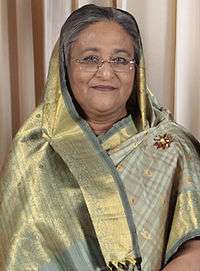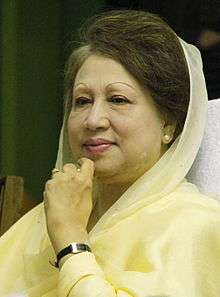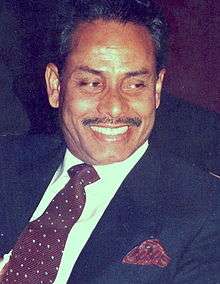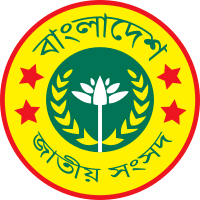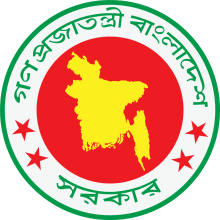Bangladeshi general election, 2008
|
| |||||||||||||||||||||||||||||||||||||||||||||
| |||||||||||||||||||||||||||||||||||||||||||||
All 300 seats in the Jatiyo Sangshad 151 seats were needed for a majority | |||||||||||||||||||||||||||||||||||||||||||||
|---|---|---|---|---|---|---|---|---|---|---|---|---|---|---|---|---|---|---|---|---|---|---|---|---|---|---|---|---|---|---|---|---|---|---|---|---|---|---|---|---|---|---|---|---|---|
| |||||||||||||||||||||||||||||||||||||||||||||
 | |||||||||||||||||||||||||||||||||||||||||||||
| |||||||||||||||||||||||||||||||||||||||||||||
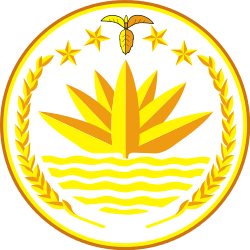 |
|---|
| This article is part of a series on the politics and government of Bangladesh |
|
Constitution and law |
|
|
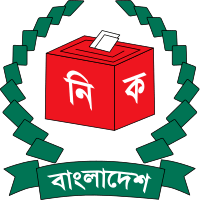 |
The Ninth National Parliamentary Elections 2008 (Bengali: নবম জাতীয় সংসদ নির্বাচন ২০০৮) were held in Bangladesh on 29 December 2008. The two main parties in the election were the Bangladesh Nationalist Party (BNP), led by Khaleda Zia, and the Bangladesh Awami League Party, led by Sheikh Hasina. The Bangladesh Awami League Party formed a fourteen-party Grand Alliance including Ershad's Jatiya Party,[1] while the BNP formed a four-party alliance which included the Islamist party Jamaat-e-Islami.[2] The election was originally scheduled for January 2007, but it was postponed by a military-controlled caretaker government for an extended period of time.
The election resulted in a landslide victory for the Awami League-led grand alliance,[3] which won 263 seats out 300. The main rival four-party alliance received only 32 seats, with the remaining four going to independent candidates. Polling in the constituency of Noakhali-1 was postponed due to the mysterious death of the AL candidate. The election for the seat was held on 12 January 2009 instead[4] and was won by the BNP candidate.[5]
Main political parties
On 11 December, Bangladesh Awami League formed a coalition with the Jatiya Party led by Hussain Muhammad Ershad once deposed through mass uprising. The coalition included some other minor parties. The Bangladesh Nationalist Party, BNP in short, continued with its alliance with Jamaat-e-Islami formed for the national election of 2001 to participate in the 2008 election. If Jatiyo Party wins more than 35 seats, it will be able to negotiate a better deal with Awami League on sharing of power and in forming government.
Awami League-led coalition (Grand Alliance)
The Bangladesh Awami League (AL) decided to participate in the 2008 parliamentary election under the name of "Grand Alliance" with the Jatiya Party led by General Ershad as its main partner. The AL contested the polls for 245 constituencies. Awami League conceded as many as 46 out of 300 parliamentary constituencies to Jatiya Party (JP).
Workers Party president Rashed Khan Menon contested for Dhaka-8, its general secretary Bimal Biswas for Narail-1, its politburo member Fazle Hossain Badsha for Rajshahi-2, Jatiya Samajtantrik Dal president Hasanul Haq Inu for Kushtia-2, its leaders Moinuddin Khan Badal for Chittagong-8, Rezaul Karim Tansen for Bogra-4, Shah Ahmed Jikrul for Brahmanbaria-5 and Gias Uddin for Mymensingh-9.
The Awami League kept the Noakhali-1 constituency reserved, where the election has been postponed following the death of Ganatantri Party leader Mohammad Nurul Islam in a mysterious fire. The alliance has kept three more seats (Nilphamari-4, Khulna-3 and Sylhet-3) open for both AL and JP candidates to contest for. Notably, as of 18 December 2008, some candidates were allowed by the High Court of the country notwithstanding a contrary decision from the Election Commission.
BNP-led coalition (4-Party Alliance)
The Bangladesh Nationalist Party (BNP) and its allies contested for 296 out of 300 in the 2008 election. The Election Commission cancelled candidacy of nominees of BNP in four constituencies. The BNP and its allies could not reach a consensus on sharing six constituencies. Bangladesh Jamaat-e-Islami contested in the election in 38 constituencies although BNP agreed to offer Jamaat 34 seats. BNP conceded two seats each to its three smaller allies which were Bangladesh Jatiya Party-BJP, Islami Oikya Jote and Jamiat-e-Olama-e-Islam. BNP was able to place any candidate for four constituencies which were Barisal-1, Moulvibazar-2, Sirajganj-5 and Narail-2. However, two BNP rebels emerged as valid independent candidates in Barisal-1 and Moulvibazar-2. They were Jahiruddin Swapan in Barisal-1 and former lawmaker MM Shaheen in Moulvibazar-2. Notably, as of 18 December 2008, some candidates were allowed by the High Court of the country notwithstanding a contrary decision of the Election Commission.
Formation of the caretaker government
The BNP-Jamat led coalition government attempted to run an election in 2006. Awami League and other parties arranged various processions and strikes, protesting that the election result was pre-arranged in the government's favour. In course of time the clash between the Government and Opposition became very violent and in the Care-taker Government's period violence engulfed the nation. The President proclaimed his authority as the chief of the Care-Taker Government and eventually had to fall to the demand of the people. With the intervention of the Army the President had to resign from his Chief-Advisor's post and Fakhruddin Ahmed was appointed as the new chief adviser.[6] The media referred to Ahmed's government as "military-backed".[7][8][9] The military-controlled government worked on a minus-two formula which meant ousting Hasina and Zia, who were two popular political leaders of the country. While all political activities were suspended under the state of emergency, the government ployed to recast the political system of the country with people of high national and international stature. In accordance with this plan, Nobel Peace Prize-winner Muhammad Yunus announced the foundation of a new party called Citizens' Power.[10] However, soon Yunus rejected entering politics, claiming a lack of support.
Struggle for new elections
.jpg)
On 5 April 2007, the country's Chief Election Commissioner, ATM Shamsul Huda, declared that the elections would need to be pushed back at least eighteen months.[11] On 12 April, Ahmed announced in a televised speech to the nation that the next parliamentary election would be held before the end of 2008.[12] On 15 July 2007, Bangladesh Election Commission published a road map for the election, promising a compilation of voter lists by October 2008 and an official election call before the end of that year.[13] The constitution of Bangladesh, however, provides holding election within 120 days of the formation of a caretaker government.
After the election, the Jatiyo Sangshad will have to elect the next President of Bangladesh. The presidential election should have taken place by 5 September 2007 when Iajuddin Ahmed's term expired. But the election was postponed as the Constitution of Bangladesh permits to delay the presidential election until a new Jatiyo Sangshad is formed.[14] On 9 September 2007, President Ahmed addressed the nation and recalled indoor politics with strict conditions to facilitate preparation for the election and reaffirmed his commitment to hold the election on time or earlier.[15] In early October, the Chief Election Commissioner Huda stated elections could be held by October 2008 if the electoral roll could be compiled by July 2008.[16]
Talks between the government and two smaller parties started on 22 May 2008, with the government indicating it would hold talks with all parties in short time.[17] However, both the Awami League and the BNP declined to attend these talks as long as their leaders were still detained.[18] Voters lists were announced to be ready on 22 July 2008.[19]
On 4 August 2008, mayor and city council elections were held in Sylhet, Khulna, Barisal and Rajshahi cities.[20] BBC News reported that the candidates supported by the Awami League won twelve of the thirteen city corporations and municipalities voting, according to election commission officials.[20] Finally, Chief Adviser Dr. Fakhruddin Ahmed announced on 21 September that the general election would be held on 18 December.[21]
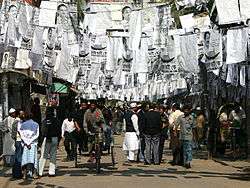
The BNP called for a delay of the election until January 2009, while the Awami League was against such a delay. As a compromise, the election was postponed from 18 to 29 December.[22] In a response to the demand of the major political parties, on 17 December 2008, the two-year-long state of emergency was lifted.[23]
Supreme Court ruling
Notably, as of 20 December, as many as 35 prospective candidates were allowed by the High Court of the country to contest in the election notwithstanding a contrary decision of the Election Commission. A winner among them will lose a seat in the parliament if the Supreme Court of Bangladesh turns down the High Court decision.
Election
The Bangladesh Election Commission announced the following statistics:
- Registered voters: 81,130,973
- Candidates: 1,538
- Constituencies: 300
- Registered parties: 32
The voter turnout of 80 percent (81 million eligible voters) was the highest in the history of Bangladeshi elections.[25][26] This was the first time elections used national ID cards with photographs to avoid bogus voting, which was an UN-funded initiative of digital electoral roll.[27][28] Priore to the elections, 11 million false names could be removed from the voter lists.[29]
Percent Vote, of total, by party
About 50,000 soldiers of Bangladeshi Army and 600,000 police officers were deployed to guard against election fraud and violence.[29] However, two people were killed in post election violence.[30] 200,000 electoral observers, including 2,500 from outside Bangladesh, monitored the elections and confirmed their free and fair nature. Before the elections, the army-backed caretaker government took measures to eliminate corruption from the process.
| Alliance | Party | Votes | % | Seats | Change | |
|---|---|---|---|---|---|---|
| Grand Alliance | Bangladesh Awami League | 33,887,451 | 49.0% | 230 | +168 | |
| Jatiya Party | 4,867,377 | 7.0% | 27 | +16 | ||
| Jatiyo Samajtantrik Dal | 429,773 | 0.6% | 3 | +2 | ||
| Workers Party of Bangladesh | 214,440 | 0.3% | 2 | +1 | ||
| Liberal Democratic Party | 161,372 | 0.2% | 1 | ±0 | ||
| Four Party Alliance | Bangladesh Nationalist Party | 22,963,836 | 33.2% | 30 | –163 | |
| Jamaat-e-Islami Bangladesh | 3,186,384 | 4.6% | 2 | –15 | ||
| Bangladesh Jatiya Party-BJP | 95,158 | 0.1% | 1 | –4 | ||
| Islami Oikya Jote | - | - | - | - | ||
| Independents and others | 3,366,858 | 4.9% | 4 | –2 | ||
| Total | 69,172,649 | 99.99% | 300 | |||
| Source: Electoral Commission of Bangladesh seat-wise tally Election commission homepage | ||||||
Total seats won in all six divisions of Bangladesh[31]
Awami League Bangladesh Nationalist Party (BNP) Jatiya Party Jatiyo Samajtantrik Dal (JSD) Jamaat-e-Islami Bangladesh (Jamaat) Workers Party of Bangladesh (BWP) Bangladesh Jatiya Party (BJP) Liberal Democratic Party (LDP) Independent
| Division | Awami League | BNP | Jatiya Party | JSD | Jamaat | BWP | BJP | LDP | Independent | Total seats |
|---|---|---|---|---|---|---|---|---|---|---|
| Barisal | 16 | 2 | 2 | 0 | 0 | 0 | 1 | 0 | 0 | 21 |
| Chittagong | 32 | 18 | 2 | 2 | 2 | 0 | 0 | 1 | 1 | 58 |
| Dhaka | 87 | 0 | 5 | 0 | 0 | 1 | 0 | 0 | 1 | 94 |
| Rajshahi | 48 | 8 | 14 | 0 | 0 | 1 | 0 | 0 | 1 | 72 |
| Khulna | 30 | 2 | 2 | 1 | 0 | 0 | 0 | 0 | 1 | 36 |
| Sylhet | 17 | 0 | 2 | 0 | 0 | 0 | 0 | 0 | 0 | 19 |
| Total | 230 | 30 | 27 | 3 | 2 | 2 | 1 | 1 | 4 | 300 |
Reactions



The UK's secretary of state for foreign and commonwealth affairs David Miliband, in the statement, urged the ruling party and the opposition to work together for nation building, shunning politics of confrontation and violence. "The Election Commission, caretaker government and observers have worked hard to create conditions in which free, fair and peaceful elections can take place. "The people of Bangladesh have spoken in huge numbers and they can be proud of the manner in which the elections were conducted", Miliband said in a statement released by the local British high commission. "This is a historic moment for Bangladesh to cast aside the politics of confrontation and violence, in favour of inclusive and consensual democracy", he added. Terming Britain as Bangladesh's friend, he said, "We urge the next government and opposition to work together to meet the expectations of the people in the days and years to come." Cherie Blair, wife of former British Prime Minister Tony Blair, also greeted Sheikh Hasina for becoming Prime Minister of Bangladesh.[37][38]



Later Japanese Prime Minister Taro Aso greeted Sheikh Hasina for her party's victory in the recent elections and also her assumption of office as the Prime Minister of Bangladesh. In a message, Taro Aso has warmly congratulated Prime Minister Sheikh Hasina for her landslide victory in the recently held general elections that was held in a `free, fair and peaceful manner'.The Japanese Prime Minister said the landslide victory is a manifestation of the trust and confidence of the people of Bangladesh in your able leadership. He said Bangladesh will make further progress and the relations between Japan and Bangladesh would strengthen `in your tenure'.Taro Aso expressed his confidence that the close bonds of friendship and cooperation existing between the two countries will continue to be enhanced in the years ahead. The Japanese Prime Minister wished her good health and happiness and expressed eagerness to work closely with Bangladesh `as an old friend' to further develop the cordial relations between the two countries.[41]



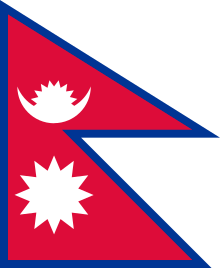
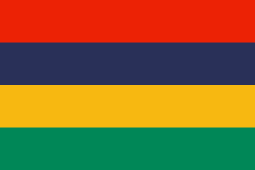



Transfer of power
The military-controlled caretaker government with Dr. Fakhruddin Ahmed as the Chief Adviser handed over power to the new government formed with Ms Sheikh Hasina as the Prime Minister of Bangladesh on 6 January 2009.
Notes and references
- ↑ "AL to contest polls under 14-party banner". Priyo.com. 17 November 2008. Archived from the original on 16 January 2009.
- ↑ "Elect 4-party to protect sovereignty: Khaleda apologises for past mistakes, wraps up campaign". The New Nation. Dhaka. 28 December 2008 – via HighBeam Research. (Subscription required (help)).
The chairperson of BNP and the leader of the four-party alliance [Begum Khaleda Zia] ... Barrister Abdur Razzak, assistant secretary general of Jamaat, Moulana Abdul Latif Nezami, secretary general of Islami Oikkya Jote ... among others, addressed the rally.
- ↑ "Bangladesh stunned by Awami victory". BBC News. 29 December 2008.
- ↑ "Bangladesh Election Commission announces results of 299 seats in Parliamentary elections". Xinhua. 31 December 2008.
- ↑ "EC satisfied with Noakhali polls". The Daily Star. UNB. 13 January 2009. Archived from the original on 29 September 2012.
- ↑ "Bangladesh president appoints head of a new caretaker government". USA Today. Associated Press. 12 January 2007.
- ↑ "McCain hails Bangladesh elections". BBC News. 3 December 2008.
- ↑ "Stir against Islamist parties contesting Bangladesh polls". Thaindian News. Indo-Asian News Service. 16 December 2008.
- ↑ Das, Antara (10 December 2008). "The other general". Indian Express.
- ↑ "Bangladesh Nobel Laureate Announces His Political Party's Name (archived)". All Headline News. 18 February 2007. Archived from the original on 20 February 2007.
- ↑ "No B'desh polls 'for 18 months'". BBC News. 5 April 2007.
- ↑ "Chief Advisor Says Election In Bangladesh To Be Held Before End Of 2008". All Headline News. 13 April 2007. Archived from the original on 29 September 2007.
- ↑ Liton, Shakhawat (16 July 2007). "Voter list by Oct '08, poll by Dec". The Daily Star.
- ↑ Dummet, Mark (5 September 2007). "Bangladesh president to continue". BBC News.
- ↑ "Ban on indoor politics relaxed". The Daily Star. 10 September 2008.
- ↑ "Bangladesh's elections may be held before October 2008". People's Daily Online. 10 October 2007.
- ↑ "Bangladesh election talks begin". BBC News. 22 May 2008.
- ↑ "Bangladesh parties decline talks". BBC News. 28 May 2008.
- ↑ Dummett, Mark (22 July 2008). "Bangladesh voters' lists 'ready". BBC News.
- 1 2 "Awami League wins B'desh election". BBC News. 5 August 2008.
- ↑ "Bangladesh's general election to be held on Dec. 18", Xinhua (People's Daily Online), 21 September 2008.
- ↑ Dummett, Mark (24 November 2008). "Bangladesh election is deferred". BBC News. Retrieved 24 November 2008.
- ↑ "Bangladesh gov't to fully withdraw state of emergency from Dec. 17". People's Daily Online. 11 December 2008.
- ↑ "Number of Candidates (Party-wise)". Bangladesh Election Commission. Archived from the original on 25 December 2008. Retrieved 30 December 2009.
- ↑ Turnout rate in Bangladesh's ninth parliamentary election highest in history , Xinhua, 30 December 2008.
- ↑ "Bangladesh polls: Hasina wins by landslide majority". IBN. Associated Press. 30 December 2008. Retrieved 30 December 2008.
- ↑ "Sheikh Hasina storms to power in Bangladesh". Rediff. 30 December 2008. Retrieved 30 December 2008.
- 1 2 "Sheikh Hasina set for Bangladesh landslide". Agence France-Presse. 30 December 2008. Archived from the original on 24 January 2013. Retrieved 31 December 2008.
- 1 2 "Hasina wins Bangladesh majority". BBC News. 30 December 2008. Retrieved 30 December 2008.
- ↑ "2 people killed in post-election violence in W Bangladesh". People.com. 30 December 2008. Retrieved 30 December 2008.
- ↑ Total seats won by political parties Archived 21 August 2011 at WebCite National Election Result 2008 - Election Commission Secretariat
- ↑ "Manmohan for close ties with Bangladesh". The Hindu. 31 December 2008. Retrieved 28 November 2015.
- ↑ "India looks forward to working with Hasina govt. : PM". The Hindu. 30 December 2008. Archived from the original on 3 November 2012. Retrieved 30 December 2008.
- ↑ "BJP hails Hasina's victory in Bangladesh". The Hindu. 30 December 2008. Archived from the original on 3 November 2012. Retrieved 30 December 2008.
- ↑ "Mamata congratulates Hasina". The Hindu. 30 December 2008. Archived from the original on 25 January 2013. Retrieved 30 December 2008.
- ↑ "Bush phones Hasina to congratulate". The Daily Star. BSS. 11 January 2009.
- 1 2 "World leaders greet Hasina". The Daily Star.
- 1 2
- 1 2 3 4 "More world leaders greet Hasina". The Daily Star.
- ↑
- ↑
- ↑ "President, PM greet Hasina Wajid on electoral victory". GEO Pakistan. Karachi. 1 January 2009. Archived from the original on 8 December 2015. Retrieved 28 November 2015.
- ↑ "U.S. Congratulates Bangladesh For Holding Election Successfully". All Headline News. 30 December 2008. Archived from the original on 16 January 2009.
- ↑ "Bangladesh's Sheikh Hasina Wins Landslide Election". Voice of America. 30 December 2008. Archived from the original on 31 December 2008. Retrieved 30 December 2008.
